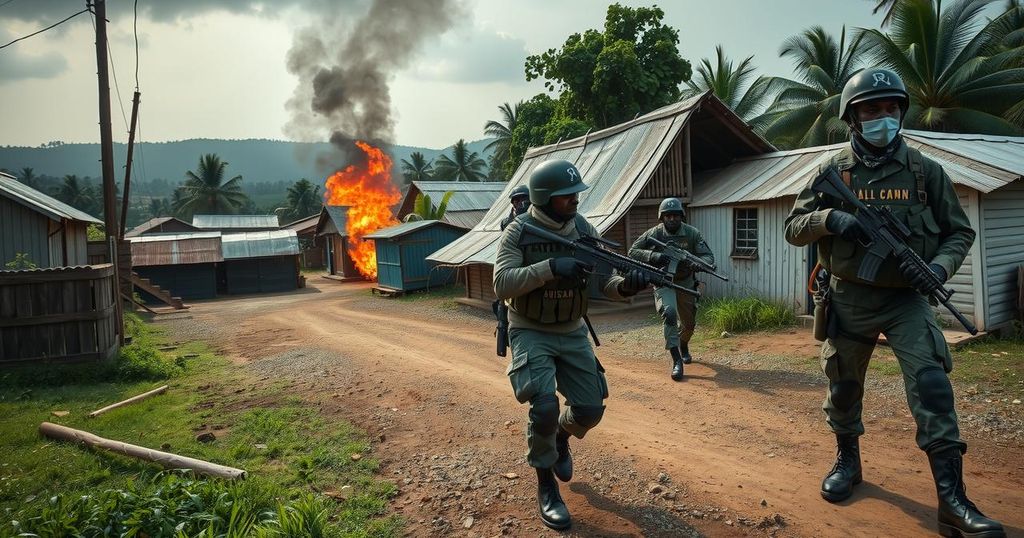Rwanda-backed M23 rebels have captured the town of Masisi in eastern DR Congo, marking their second town takeover in two days. This escalation compounds a humanitarian crisis, displacing hundreds of thousands of residents amid stalled peace talks between DRC and Rwanda. Local authorities are calling for enhanced military response to the growing threat of the M23.
In recent developments, rebel forces allied with Rwanda have seized the town of Masisi in the eastern region of the Democratic Republic of Congo (DRC). This marks the second town captured by the M23 group within two days, intensifying the conflict in the resource-rich North Kivu province. The ongoing violence has led to significant displacement, with hundreds of thousands of residents forced to flee their homes. Furthermore, diplomacy efforts by Angola aimed at resolving tensions between the DRC’s President Félix Tshisekedi and Rwandan President Paul Kagame have stalled since last month.
Alexis Bahunga, a member of the North Kivu provincial assembly, expressed grave concern over the situation, stating, “It is with dismay that we learn of the capture of Masisi centre by the M23.” He emphasized the urgent need for the government to bolster military capabilities in the area, highlighting the potential escalation into a severe humanitarian crisis. Reports also indicated that the M23 held a public meeting, insinuating their intent to assist in the liberation of the nation.
The town of Masisi has a population of approximately 40,000 and serves as the capital of its eponymous territory, situated roughly 80 kilometers north of Goma, the provincial capital that was previously occupied by the M23 in 2012. On the preceding Friday, the M23 had already taken the nearby town of Katale, contributing to rising anxieties about a potential offensive toward Goma, a city housing around two million residents. Despite a prior lull in hostilities, violence resumed in early December, coinciding with the M23’s resurgence.
Rwanda has acknowledged the presence of its troops in the conflict, with a UN report confirming about 4,000 soldiers supporting the M23. The Rwandan government has asserted that the Congolese authorities have inadequately addressed longstanding regional conflicts and have allegedly collaborated with individuals implicated in the 1994 Rwandan genocide against Tutsis. Founded in 2012 as a faction to advocate for the Tutsi minority in eastern DRC, the M23 has faced allegations of exploiting the region’s minerals, including gold and cobalt, crucial for global technology industries. Recent legal actions by the DRC against major corporations, including a lawsuit against Apple concerning the sourcing of these “blood minerals,” further underscore the complexities of the situation in eastern Congo.
The conflict in the eastern Democratic Republic of Congo is a multifaceted crisis, deeply rooted in historical grievances and geopolitical tensions involving regional players like Rwanda. The M23 rebel group, originally formed to protect the Tutsi minority, has been accused of committing human rights abuses and exploiting the mineral wealth of the DRC, including precious resources like gold and cobalt that drive global industry. Mediation efforts by neighboring Angola highlight the international dimensions of the conflict, yet such initiatives have often faltered amid renewed violence and military advancements by rebel factions. The humanitarian toll of this ongoing struggle has resulted in massive displacements and a dire need for humanitarian aid.
In conclusion, the recent seizure of Masisi by Rwandan-backed rebels underscores the escalating conflict in the eastern Democratic Republic of Congo, raising urgent humanitarian concerns and complicating regional stability. As mediatory efforts stall, the ramifications of the M23’s territorial gains continue to threaten the safety and well-being of local populations. The international community must recognize the gravity of the situation and consider renewed interventions to address both humanitarian needs and the underlying causes of this persistent crisis.
Original Source: www.bbc.co.uk






